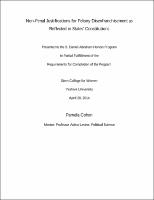Please use this identifier to cite or link to this item:
https://hdl.handle.net/20.500.12202/4188Full metadata record
| DC Field | Value | Language |
|---|---|---|
| dc.contributor.author | Cohen, Pamela | - |
| dc.date.accessioned | 2018-11-08T21:25:45Z | - |
| dc.date.available | 2018-11-08T21:25:45Z | - |
| dc.date.issued | 2014-04 | - |
| dc.identifier.uri | https://hdl.handle.net/20.500.12202/4188 | - |
| dc.identifier.uri | https://ezproxy.yu.edu/login?url=https://repository.yu.edu/handle/20.500.12202/4188 | |
| dc.description | The file is restricted for YU community access only. | - |
| dc.description.abstract | The right to vote has been viewed as a fundamental right since the establishment of the United States. To protect the democracy and representation that the founding fathers had fought for, it was of utmost importance that the right to vote would be extended to all citizens1 . Whereas at the establishment of the nation the right was reserved for White males, as time progressed, more and more people have been given the opportunity to participate in democracy. This includes women, Blacks, and young adults2 . Presently, there are still members of society who are not granted the right to vote. This group includes aliens, minors, those deemed mentally incapable, and people who have been convicted of felonies. It is not difficult to conceive of a justification for denying the right from the first three groups of people, as they are either not officially a member of the society or are not mentally capable of voting responsibly, but difficulties arise upon trying to justify excluding those members of society who have been convicted of felonies3 . Currently, only two states, Vermont and Maine, allow felons to vote even while incarcerated4 . The rest of the 48 states differ with regard to for how long they exclude criminals, with some denying the right for life and others only for the period of time in which the person is actually incarcerated5 . However, the precedent has been set that it is indeed justifiable and constitutional for the states to take away this right. | en_US |
| dc.description.sponsorship | S. Daniel Abraham Honors Program | en_US |
| dc.language.iso | en_US | en_US |
| dc.publisher | Stern College for Women | en_US |
| dc.rights | Attribution-NonCommercial-NoDerivs 3.0 United States | * |
| dc.rights.uri | http://creativecommons.org/licenses/by-nc-nd/3.0/us/ | * |
| dc.subject | Prisoners --Suffrage --United States. | en_US |
| dc.subject | Ex-convicts --Suffrage --United States. | en_US |
| dc.subject | Suffrage --United States. | en_US |
| dc.subject | Prisoners --Civil rights --United States. | en_US |
| dc.subject | Political rights, Loss of --United States. | en_US |
| dc.subject | Prisoners --Legal status, laws, etc. --United States. | en_US |
| dc.title | Non-Penal Justifications for Felony Disenfranchisement as Reflected in States' Constitutions | en_US |
| dc.type | Thesis | en_US |
| Appears in Collections: | S. Daniel Abraham Honors Student Theses | |
Files in This Item:
| File | Description | Size | Format | |
|---|---|---|---|---|
| Pamela Cohen.pdf Restricted Access | 555.63 kB | Adobe PDF |  View/Open |
This item is licensed under a Creative Commons License

